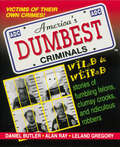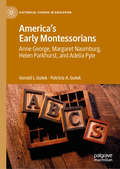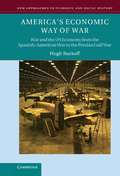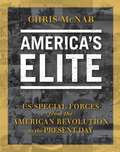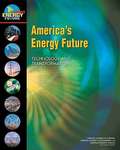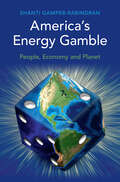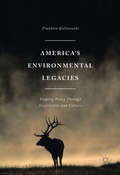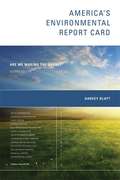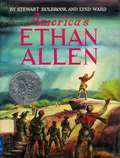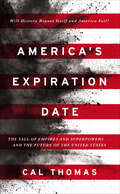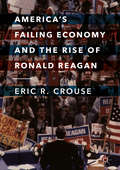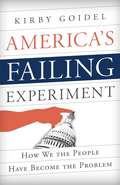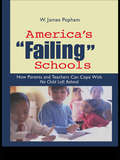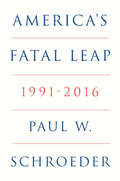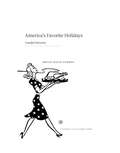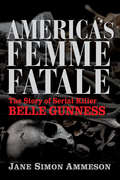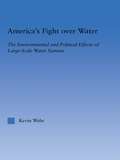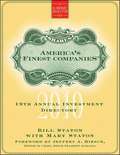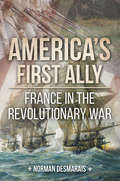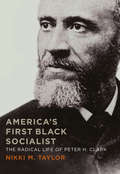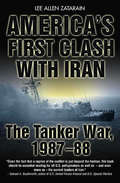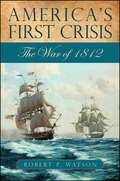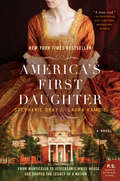- Table View
- List View
America's Dumbest Criminals: Wild & Weird Stories of Fumbling Felons, Clumsy Crooks, and Ridiculous Robbers
by Daniel Butler Leland Gregory Alan Ray100 crazy stories of America's dumbest criminals. WARNING: The crimes you are about to read are true. The names have been changed . . . to protect the ignorant.Here is the ultimate collection of the most incredibly stupid and painfully dumb attempts at crime ever brought together.The woman who invalidated her winning $5,000 lottery ticket by altering it to match the $20 prize numberThe accused vending-machine thief who paid his $400 bail entirely in quartersThe streaking robber who thought clothes would make him more identifiableThe convenience store thief who got away with just a hotdog, only to end up in the parking lot choking on the wiener
America's Early Montessorians: Anne George, Margaret Naumburg, Helen Parkhurst and Adelia Pyle (Historical Studies in Education)
by Gerald L. Gutek Patricia A. GutekThis book traces the early history of the Montessori movement in the United States through the lives and careers of four key American women: Anne George, Margaret Naumburg, Helen Parkhurst, and Adelia Pyle. Caught up in the Montessori craze sweeping the United States in the Progressive era, each played a significant role in the initial transference of Montessori education to America and its implementation from 1910 to 1920. Despite the continuing international recognition of Maria Montessori and the presence of Montessori schools world-wide, Montessori receives only cursory mention in the history of education, especially by recognized historians in the field and in courses in professional education and teacher preparation. The authors, in seeking to fill this historical void, integrate institutional history with analysis of the interplay and tensions between these four women to tell this educational story in an interesting—and often dramatic—way.
America's Economic Way of War: War and the US Economy from the Spanish-American War to the First Gulf War
by Hugh RockoffHow did economic and financial factors determine how America waged war in the twentieth century? This important new book exposes the influence of economics and finance on the questions of whether the nation should go to war, how wars would be fought, how resources would be mobilized, and the long-term consequences for the American economy. Ranging from the Spanish-American War to the Gulf War, Hugh Rockoff explores the ways in which war can provide unique opportunities for understanding the basic principles of economics as wars produce immense changes in monetary and fiscal policy and so provide a wealth of information about how these policies actually work. He shows that wars have been more costly to the United States than most Americans realize as a substantial reliance on borrowing from the public, money creation and other strategies to finance America's war efforts have hidden the true cost of war.
America's Economic Way of War: War and the US Economy from the Spanish-American War to the Persian Gulf War
by Hugh RockoffHow did economic and financial factors determine how America waged war in the twentieth century? This important new book exposes the influence of economics and finance on the questions of whether the nation should go to war, how wars would be fought, how resources would be mobilized, and the long-term consequences for the American economy. Ranging from the Spanish-American War to the Gulf War, Hugh Rockoff explores the ways in which war can provide unique opportunities for understanding the basic principles of economics as wars produce immense changes in monetary and fiscal policy and so provide a wealth of information about how these policies actually work. He shows that wars have been more costly to the United States than most Americans realize as a substantial reliance on borrowing from the public, money creation and other strategies to finance America's war efforts have hidden the true cost of war.
America's Elite: US Special Forces from the American Revolution to the Present Day
by Chris McnabFrom Roger's Rangers to the Revolution, Civil War, World War I & II, Korea, Vietnam, Iraq, Afghanistan, and the Bin Laden raid, this book covers over 250 years of American Special Forces action. America's Elite takes the reader through some of the most dramatic special forces operations in US history, from sniping British commanders during the Revolutionary War to Riverine incursions in the Mekong Delta in Vietnam, and from demolition missions on D-Day to the SEAL assault on Osama bin Laden's compound in 2011. Training and selection procedures are explained in detail, and the book also describes some of the technologies that have separated regular soldiers from their Special Forces counterparts. Illustrated throughout with striking photography and artworks, America's Elite forms the most comprehensive and visually impressive single-volume guide to US Special Forces available.
America's Energy Future: Technology and Transformation
by National Academy of Science National Academy of Enegineering National Research Council of the National AcademiesEnergy touches our lives in countless ways and its costs are felt when we fill up at the gas pump, pay our home heating bills, and keep businesses both large and small running. There are long-term costs as well: to the environment, as natural resources are depleted and pollution contributes to global climate change, and to national security and independence, as many of the world's current energy sources are increasingly concentrated in geopolitically unstable regions. The country's challenge is to develop an energy portfolio that addresses these concerns while still providing sufficient, affordable energy reserves for the nation. The United States has enormous resources to put behind solutions to this energy challenge; the dilemma is to identify which solutions are the right ones. Before deciding which energy technologies to develop, and on what timeline, we need to understand them better. America's Energy Future analyzes the potential of a wide range of technologies for generation, distribution, and conservation of energy. This book considers technologies to increase energy efficiency, coal-fired power generation, nuclear power, renewable energy, oil and natural gas, and alternative transportation fuels. It offers a detailed assessment of the associated impacts and projected costs of implementing each technology and categorizes them into three time frames for implementation.
America's Energy Gamble: People, Economy and Planet
by Shanti Gamper-RabindranHow can America get back to an energy transition that's good for the economy and the environment? That's the question at the heart of this eye-opening and richly informative dissection of the Trump administration's energy policy. The policy was ardently pro-fossil fuel and ferociously anti-regulation, implemented by manipulating science and economic analysis, putting oil and gas insiders at the helm of environmental agencies, and hacking away at democratic norms that once enjoyed bipartisan support. The impacts on the nation's health, economy, and environment were - as this book carefully demonstrates - dire. But the damage can be reversed. Ordinary Americans, civil society groups, environmental professionals, and politicians at every level all have parts to play in making sure the needed energy transition leaves no one behind. This compelling book will appeal to course instructors and students, government and industry officials, activists and journalists, and everyone concerned about the nation's future.
America's Environmental Legacies: Shaping Policy through Institutions and Culture
by Franklin KalinowskiThis powerful book focuses on the capacity of the American political system to respond to ecological challenges through policy perspectives, the constraints of our written Constitution, and the determination we muster to address these tests of national character. Put simply, this is a book about politics, policy, and political will. Kalinowski brilliantly shows that America's collective will is founded in the cultural values enunciated by the Founding Fathers, passed down through history with modifications, and comprises the essential missing ingredient in determining how we currently respond to crises. Thomas Jefferson, Alexander Hamilton, and James Madison had distinct ideas concerning the role that Nature might play in the future. Recognizing the origins and impacts of their environmental legacies is the key to interpreting where American environmental politics is today, how we got here, and where we might be headed.
America's Environmental Report Card
by Harvey BlattA timely survey of the state of America's environment: how we can take action to achieve a sustainable future.
America's Ethan Allen
by Stewart H. HolbrookThis book presents the life and legends of Colonel Ethan Allen and Green Mountain boys of the American Revolution.
America's Expiration Date: The Fall of Empires and Superpowers . . . and the Future of the United States
by Cal ThomasA warning and a wake-up call to learn history so we are not doomed to repeat it. A must-read for anyone who longs for a promising future for our great nation.What is wrong with America today? Is it possible that America could crumble and our democracy fail?Questions like these plague Americans and cause us to be anxious about the future of the "land that we love." Individuals may come to different conclusions, but there seems to be a common thread - the deep-seated feeling that we need to improve our country. Our culture is increasingly immoral, the family structure is threatened from all sides, and government programs consistently overreach, creating massive debt.In this powerful and prophetic book, nationally syndicated columnist and trusted political commentator Cal Thomas offers a diagnosis of what exactly is wrong with the United States by drawing parallels to once-great empires and nations that declined into oblivion. Citing the historically proven 250-year pattern of how superpowers rise and fall, he predicts that America's expiration date is just around the corner and shows us how to escape their fate.Through biblical insights and hard-hitting truth, he reminds us that real change comes when America looks to God instead of Washington. Scripture, rather than politics, is the GPS he uses to point readers to the right road - a road of hope, life, and change. Because, he says, if we're willing to seek God first, learn from history, and make changes at the individual and community level, we can not only survive, but thrive, again.This powerful, timely, and much-needed perspective is a must-read for anyone who longs for a promising future for our great nation.
America's Failing Economy and the Rise of Ronald Reagan
by Eric R. CrouseThis book examines one of the most important economic outcomes in American history—the breakdown of the Keynesian Revolution. Drawing on economic literature, the memoirs of economists and politicians, and the popular press, Eric Crouse examines how economic decline in the 1970s precipitated a political revolution. Keynesian thought flourished through the presidencies of Lyndon B. Johnson, Richard Nixon, and Gerald Ford, until stagflation devastated American workers and Jimmy Carter’s economic policies faltered, setting the stage for the 1980 presidential campaign. Tracking years of shifting public opinion and colorful debate between free-market and Keynesian economists, this book illuminates a neglected era of American economic history and shows how Ronald Reagan harnessed a vision of small government and personal freedom that transformed the American political landscape.
America's Failing Experiment: How We The People Have Become The Problem
by Kirby GoidelWritten in a provocative, jargon-free style ideal for stimulating classroom discussion, America's Failing Experiment directly challenges would-be reformers who believe the solution to our current political paralysis is more democracy. Kirby Goidel finds that the fault for our contemporary political dysfunction resides not with our elected officials but with our democratic citizenries. He argues that our elected officials are overly responsive to public opinion which is often poorly informed, incoherent, and uncertain. The result is a more polarized political system, rising inequality, and institutional gridlock. Though not new, these concerns take on deeper political significance in a digital age where information flows more quickly and opportunities for feedback are virtually unlimited. If the diagnosis is too much democracy, the counterintuitive solution runs against our cultural norms—less citizen involvement, greater discretion for political elites, and greater collective responsibility.
America's Failing Schools: How Parents and Teachers Can Cope With No Child Left Behind
by W. James PophamIn America's "Failing" Schools, W. James Popham provides parents and teachers explanations of No Child Left Behind as a whole, walking them through the implications for standardized testing in particular, in language that is uncomplicated and straightforward. Popham offers definitions of the law and its key terms, explanations of what it really means when a school is labeled "failing," and concrete suggestions for what can be done in response.
America's Fatal Leap: 1991-2016
by Paul W. SchroederA decisive analytic critique of US foreign policy by one of America&’s greatest historiansAmerica's Fatal Leap deconstructs US geopolitics after the end of the Cold War, informed by its author's unsurpassed command of modern history. Paul W. Schroeder, an acclaimed historian of international diplomacy, was a conservative and a natural supporter of American leadership in the world.But he wrote scathing op-eds for the National Interest and the American Conservative about the hubris and moral failings of the War on Terror, warning of damaging long-range effects on the international system. Schroeder compared 9/11 to the assassination in Sarajevo that sparked the First World War, insisting that a great power should never give terrorists a war they wanted.He wrote with extraordinary prescience - months before the US launched its attack on the Taliban - of the 'risks of victory' in Afghanistan, characterised the war in Iraq as a failed bid for informal empire, and called for 'disimperialism' in the Middle East.America's Fatal Leap collects Schroeder's remarkable interventions on America's adventurism in the Middle East, from the 1991 Gulf War to the Surge of 2007. It includes an Introduction by Perry Anderson, author of US Foreign Policy and Its Thinkers and Ever Closer Union?
America's Favorite Holidays
by Bruce David ForbesAmerica's Favorite Holidays explores how five of America's culturally important holidays--Christmas, Valentine's Day, Easter, Halloween, and Thanksgiving--came to be what they are today, seasonal and religious celebrations heavily influenced by modern popular culture. Deftly distilling information from a wide range of sources, Bruce David Forbes reveals often-surprising answers to questions about each holiday's traditions. Was Christmas always as commercialized as it is today? Is Thanksgiving a religious or secular holiday? When did we begin trick-or-treating on Halloween? Appealing and insightful, America's Favorite Holidays satisfies our curiosity about the origins of our holidays and the fascinating ways in which religion and culture mix.
America's Favorite Radio Station: WKRP in Cincinnati
by Michael B. KasselAlthough it became one of the most successful programs in syndicated television history, WKRP in Cincinnati faced an uphill struggle trying to obtain prime-time success. Kassel chronicles the decisions and problems that affected WKRP's primetime success, and explores the reasons why it went on to become a classic.
America's Femme Fatale: The Story of Serial Killer Belle Gunness
by Jane Simon AmmesonHow does a Norwegian farm girl become an infamous American serial killer, responsible for upward of 40 murders? Born in rural Norway in 1859, "Belle" Storset Sorenson Gunness was constantly dealt bad hands in life—so she decided to take life into her own hands. In America's Femme Fatale: The Story of Serial Killer Belle Gunness, Jane Simon Ammeson traces Gunness's path from a poor teenager rejected by a wealthy lover; to a new wife in Chicago, desperate to escape the poverty of her childhood and impatient for a child to love; to an ambitious, widowed landowner in La Porte, Indiana. Ammeson's careful research reveals how the young immigrant slowly turned into one of America's most dangerous serial killers, allegedly murdering husbands, lovers, and children, and, for a price, disposing of inconvenient corpses for others. Ammeson brings this shocking story to life, detailing the suspicious neighbors who were cowed into silence by Belle's intimidating personality, the culture of orphanages trafficking children and matrimonial agencies, the carnival atmosphere that exploded around the pile of bones found on Gunness's farm, and the sensational reporting that filled newspapers for months.Perfect for true crime fans fascinated by the creation of a sociopathic serial killer, America's Femme Fatale will leave you entertained and looking over your shoulder.
America's Fight Over Water: The Environmental and Political Effects of Large-Scale Water Systems (Studies in American Popular History and Culture)
by Kevin WehrThis book inquires into the relations between society and its natural environment by examining the historical discourse around several cases of state building in the American West: the construction of three high dams from 1928 to 1963.
America's Finest Companies 2010
by Bill Staton Hirsch Mary StatonA detailed look at the best American companies to invest inAmerica's Finest Companies 2010 (now in its 19th annual edition) is a reliable guide to investing, containing every publicly traded company in the United States with at least ten consecutive years of higher dividends and/or earnings per share.With this detailed directory, Bill Staton--a successful financial advisor and money manager for almost four decades--shares his simple, time-tested way to make your money grow at an above-average rate with substantially reduced risk. The companies found here are well-run and profitable, and with long histories of rising annual dividends and/or earnings, they are sure to boost the bottom line of any portfolio.Offers essential insights into building a portfolio of American companies with rising annual dividends and/or earningsContains new listings and delistings as well as a break down of companies by industryFilled with thoughtful editorial pieces such as "Dow 30,000 by 2018", "Trends Don't Go On Forever", and "Turning Chaos Into Tremendous Opportunity"America's Finest Companies 2010 will help you rebuild your portfolio and keep it on sound financial footing for years to come. If you're looking to invest successfully, look no further than America's Finest Companies 2010.
America's First Ally: France in the Revolutionary War (The Pocket Manual Series)
by Norman Desmarais<p>The Revolutionary War historian provides “a comprehensive and accessible guide” to the vital influence France had on America’s path to independence (Publishers Weekly).<p> <p>French support for United States independence was both vital and varied, ranging from ideological inspiration to financial and military support. In this study, historian Norman Desmarais offers an in-depth analysis of this crucial relationship, exploring whether America could have won its independence without its first ally.<p> <p>Demarais begins with the contributions of French Enlightenment thinkers who provided the intellectual frameworks for the American and French revolutions. He then covers the many forms of aid provided by France during the Revolutionary War, including the contributions of individual French officers and troops, as well as covert aid provided before the war began. France also provided naval assistance, particularly to the American privateers who harassed British shipping. Detailed accounts drawn from ships’ logs, court and auction records, newspapers, letters, diaries, journals, and pension applications.<p> <p>In a more sweeping analysis, Desmarais explores the international nature of a war which some consider the first world war. When France and Spain entered the conflict, they fought the Crown forces in their respective areas of economic interest. In addition to the engagements in the Atlantic Ocean, along the American and European coasts and in the West Indies, there are accounts of action in India and the East Indies, South America and Africa.<p>
America's First Black Socialist: The Radical Life of Peter H. Clark
by Nikki M. TaylorThis authoritative biography chronicles the pioneering work of a nineteenth-century Black abolitionist and civil rights activist.Growing up in the free state of Ohio before the Civil War, Peter H. Clark dedicated himself to the abolitionist cause. In pursuit of equal citizenship for African Americans, Clark was at various times a loyal supporter of the Republican Party, and an advocate for the Democrats, and the country's first black socialist. Clark led the fight for African Americans' access to Ohio's public schools and became the first black principal in the state.America's First Black Socialist draws upon speeches, correspondence, and outside commentary to provide a balanced account of this influential yet neglected figure. Charting Clark's changing allegiances and ideologies from the antebellum era through the 1920s, this comprehensive biography illuminates the life and legacy of an important activist while also highlighting the black radical tradition that helped democratize America.
America's First Clash with Iran: The Tanker War, 1987–88
by Lee Allen ZatarainA revealing account of the US conflict with Iran over the Persian Gulf during the Reagan era—and the groundwork it set for today&’s tensions. In May 1987, the US frigate Stark was blown apart by an Iraqi jet fighter in the Persian Gulf, jumpstarting a major conflict with Iran that came to be known as the Tanker War. In America&’s First Clash with Iran, author Lee Allen Zatarain employs Pentagon documents and firsthand interviews to reveal the full story of a conflict that may have presaged further battles to come. At the climax of the Iran-Iraq War, Iran was losing on the battlefield. Ayatollah Khomeini decided to close the Persian Gulf against shipping from Iraq&’s oil-rich backer, the emirate of Kuwait. When the United States sent a fleet to the Gulf, raising the Stars and Stripes over Kuwait&’s commercial tankers, a tinderbox was set off. The Iranians laid mines throughout the narrow passage and launched attack boats against both tankers and US warships. The US Navy fought its largest surface battle since World War II against the Ayatollah&’s assault boats. As Saddam Hussein looked on, Iranian gunners fired missiles against US forces—actions which, if made known at the time, would have required the US Congress to declare war against Iran.
America's First Crisis: The War of 1812 (Excelsior Editions)
by Robert P. WatsonGold Medalist, 2015 Independent Publisher Book Awards in the U.S. History CategoryThe War of 1812, sometimes called "America's forgotten war," was a curious affair. At the time, it was dismissed as "Mr. Madison's War." Later it was hailed by some as America's "Second War for Independence" and ridiculed by others, such as President Harry Truman, as "the silliest damned war we ever had." The conflict, which produced several great heroes and future presidents, was all this and more.In America's First Crisis Robert P. Watson tells the stories of the most intriguing battles and leaders and shares the most important blunders and victories of the war. What started out as an effort to invade Canada, fueled by anger over the harassment of American merchant ships by the Royal Navy, soon turned into an all-out effort to fend off an invasion by Britain. Armies marched across the Canadian border and sacked villages; navies battled on Lake Ontario, Lake Champlain, and the world's oceans; both the American and Canadian capitals were burned; and, in a final irony, the United States won its greatest victory in New Orleans—after the peace treaty had been signed.
America's First Daughter
by Stephanie Dray Laura KamoieIn a compelling, richly researched novel that draws from thousands of letters and original sources, bestselling authors Stephanie Dray and Laura Kamoie tell the fascinating, untold story of Thomas Jefferson's eldest daughter, Martha "Patsy" Jefferson Randolph--a woman who kept the secrets of our most enigmatic founding father and shaped an American legacy.<P><P> From her earliest days, Patsy Jefferson knows that though her father loves his family dearly, his devotion to his country runs deeper still. As Thomas Jefferson's oldest daughter, she becomes his helpmate, protector, and constant companion in the wake of her mother's death, traveling with him when he becomes American minister to France.<P> It is in Paris, at the glittering court and among the first tumultuous days of revolution, that fifteen-year-old Patsy learns about her father's troubling liaison with Sally Hemings, a slave girl her own age. Meanwhile, Patsy has fallen in love--with her father's protégé William Short, a staunch abolitionist and ambitious diplomat. Torn between love, principles, and the bonds of family, Patsy questions whether she can choose a life as William's wife and still be a devoted daughter.<P> Her choice will follow her in the years to come, to Virginia farmland, Monticello, and even the White House. And as scandal, tragedy, and poverty threaten her family, Patsy must decide how much she will sacrifice to protect her father's reputation, in the process defining not just his political legacy, but that of the nation he founded. <P><b>A New York Times Bestseller</b>
